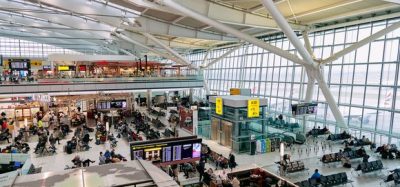Decision time for UK aviation
- Like
- Digg
- Del
- Tumblr
- VKontakte
- Buffer
- Love This
- Odnoklassniki
- Meneame
- Blogger
- Amazon
- Yahoo Mail
- Gmail
- AOL
- Newsvine
- HackerNews
- Evernote
- MySpace
- Mail.ru
- Viadeo
- Line
- Comments
- Yummly
- SMS
- Viber
- Telegram
- Subscribe
- Skype
- Facebook Messenger
- Kakao
- LiveJournal
- Yammer
- Edgar
- Fintel
- Mix
- Instapaper
- Copy Link
Posted: 8 December 2014 | Darren Caplan, CEO, UK Airport Operators Association
To achieve real growth, UK aviation needs the Government to make key decisions to support it, says Darren Caplan, Chief Executive of the UK Airport Operators Association…
Aviation is critical to the UK economy; supporting around a million jobs and contributing £50 billion to the UK economy and over £8 billion annually in UK Treasury revenues. It also provides the connectivity required to support the tourism, exports, manufacturing and services sectors. Decisions taken on three key issues in the coming months will help determine whether UK airports and airlines can continue to point the way for our sector across the world.
Firstly, we need to look at aviation policy and sustainability. Last year the UK government published its Aviation Policy Framework, in which the Secretary of State for Transport said: “The Government believes that aviation needs to grow, delivering the benefits essential to our economic wellbeing, whilst respecting the environment and protecting quality of life.” This is significant as the official policy up to 2012 was that aviation should not grow and that the sector needed to get “better not bigger”.
Key to permission to grow, however, is the work being conducted on the sustainability agenda by the Sustainable Aviation (SA) coalition of UK airports, airlines, aerospace manufacturers and NATS. The SA produced Carbon and Noise Road Maps in 2012 and 2013 respectively, which show how the sector can almost double its air traffic movements to 2015 without any significant increase in either. And earlier in 2014, the Airport Operators Association produced a fresh report showing that airports representing 95 per cent of travellers had increased their passenger numbers by five per cent between 2010 and 2012 whilst reducing carbon by three per cent – evidence that the sector can step up to the plate by expanding whilst delivering for the environment.
In December 2014, the SA will be publishing a Sustainable Aviation Fuels Road Map, which will plot the path that the sector and the Government could take to enable UK aviation to reduce its carbon emissions by 18 per cent by 2050, through the uptake of this new technology. If we get this right, sustainable aviation fuels could be contributing up to £480 million a year to the UK economy by 2030, with up to 12 new plants producing sustainable fuels. UK airlines are already playing their part, with British Airways developing plasma technology to convert residual waste and Virgin Atlantic planning to use microbes to convert waste carbon monoxide gases from steel mills. But they will need help from the Government to reduce investor risk in bringing the technology to a commercial scale, by providing an incentive framework to stimulate investment in new fuels.
So the first key decision is will the Government support the increased development and uptake of sustainable fuels?
The second key area lies in airport expansion. 2015 will see the UK reach a moment of truth for the future of airport capacity. A Government-appointed Airports Commission, led by Sir Howard Davies, has already said that London and the South East will need at least one new runway by 2030, and probably a second runway by 2050, to avoid a capacity crunch; and it is about to launch a final consultation on its recommendation that additional runway capacity should be developed at either Gatwick or Heathrow Airport. By summer 2015, the Commission will make its recommendations – both on runway capacity and on how to get more out of existing capacity – and a newly-elected UK Government and Prime Minister will have to decide whether to act on the Commission’s recommendation.
The Airport Operators Association has been urging politicians at recent party conferences to take the brave course of supporting the Commission; not ruling out any options this side of next year’s general election and preparing to take a decision in the summer that successive Governments have ducked for far too long. So far the signs are encouraging, with both the Conservatives and Labour saying they will back the Commission; and the Liberal Democrat leadership surprisingly taking on its activists to support some form of additional capacity (even though the grassroots in debate continued their policy of refusing any net increase in runways).
So key decision two is will the new Government and its Prime Minister act on the findings of the Airports Commission after next summer’s general election?
Thirdly, there is an area where the Airport Operators Association hopes that the UK might soon lose its international leadership position: Air Passenger Duty (APD).
Despite some recent welcome reforms – the March 2014 Budget saw the highest bands of APD abolished so there are now just two bands for flights below 2,000 miles and flights over 2,000 miles – the UK’s aviation taxes still remain the highest in the world. On average the UK pays five times more in departure taxes than the other EU countries that levy a charge, and 22 out of 28 EU countries levy no APD at all – a family of four flying to the U.S. from the UK pays around $445 in APD.
UK politicians are fond of saying that they support hard-working families, but the reality is that APD makes it harder for families to visit friends and family or take holidays around the UK or abroad. Such high levels of APD don’t only affect passenger numbers but they also impact on the UK’s connectivity, as international airlines decide to route fewer services to the UK or abandon routes altogether.
And this is why the Airport Operators Association will be working with airports, airlines, travel and tourism organisations, business groups and even ‘destination’ bodies this autumn as part of a new ‘Fair Tax on Flying’ campaign to persuade the UK Government to deal with this issue. In particular by abolishing APD for children under the age of 12 in the first instance, with a view to the overall tax being reviewed and reduced longer term.
Key decision three, then, is will the Government axe APD on children; and following the election review the overall damage APD is doing, with a view to cutting it in the years to come?
It is clear that we in the UK have a crowded agenda, but we are determined to make progress on each of these issues so that UK airports and aviation more widely continue to have a vibrant future and to make a vital contribution to the sustainable growth of the UK economy. If we can demonstrate that our sector can deliver on sustainability, and if our government can support it by promoting growth, backing the Airports Commission, and cutting APD, we really will be set for rapid take off in the years ahead.
Biography
Darren Caplan has been Chief Executive of the Airport Operators Association since January 2011, with 14 years previous experience in communications, public affairs and politics in a number of sectors, including infrastructure, planning and technology. Darren is passionate about the benefits the aviation sector brings, be they global trade benefits to UK PLC, boosting regional and local growth or enabling millions of people to visit friends and family in the UK and around the world. Darren is a regular industry conference speaker and joined International Airport Review’s Editorial Board in 2013.

















